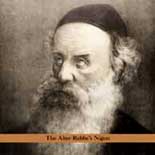 Writing my post about nigunim reminds me of one of my favorite albums: Oren Ambarchi and Robbie Avenaim's "The Alter Rebbe's Nigun." This recording is not at all part of the contemporary Chassidic music scence, but draws heavily on Chassidic nigunim. The album was released in 1999 by my favorite label, John Zorn's Tzadik Radical Jewish Culture. The Tzadik blurb describes it like this:
Writing my post about nigunim reminds me of one of my favorite albums: Oren Ambarchi and Robbie Avenaim's "The Alter Rebbe's Nigun." This recording is not at all part of the contemporary Chassidic music scence, but draws heavily on Chassidic nigunim. The album was released in 1999 by my favorite label, John Zorn's Tzadik Radical Jewish Culture. The Tzadik blurb describes it like this:Formerly orthodox Hasidic students of Talmud and Tanya, these two members of the Australian punk unit PHLEGM have brought together influences from Boredoms and the Japanese noise scene, traditional Jewish Nigunim and Yiddish theatre, Marc Ribot, Ornette Coleman and countless others to create a new world of twisted dreams and startling sonorities.
Ari Davidow of Klezmershack described it like this:
Opening with gentle guitars, and quickly descending to the clash of disharmonic guitar, then on to heavy metal soaring, the album begins with the first level, "Asiyah" (Action). Then there is the spaciness of "Yetzirah" (Formation), with pipelike tubes of sound, followed by shofar-like crescendos as something builds.... Gradually, we are left with creaks of sound slowly leaving behind silence as we move to the third sphere, "Beriah" (Creation) and the buzz of kazoo-like ullulation. Now space begins to close in as sound gathers, filling the emptiness, and eventually, amid the random percussion, there is the rapid-fire of guitar notes, gradually replaced by a glockenspiel playing a hasidic nigun. And finally, on to Atzilut (emanation). Behind a reading, in a very Ashkenazic Hebrew, about the Alter Rebbe's nigun, looping and spliced, the sounds begin to slowly reverberate, as from afar. Electronica, sound, slowly begin to create an ethereal, fascinating texture. After all, in true Jewish fashion, text must be part of the highest level of G-dly emanation; formed text is no less a part of what it means to be Jewish than the sounds we gather around that text. Suddenly, the words are processed further, so that they become as babble behind a now-noisy tapestry of white noise, crashing, random guitar chords, and then the words resolve themselves as recognizable nigun, created out of the white noise, gradually building in passion until it sounds like a huge crowd of dancing, singing hassidim. Then silence, and the rebbe resumes reading over gentle guitar picking out sounds that, again, resolve themselves as nigun, sounding more an more like human voice, wordless. Asiyah. Action.
Great review. I can't do better and won't try. The album is once again in heavy rotation.








No comments:
Post a Comment